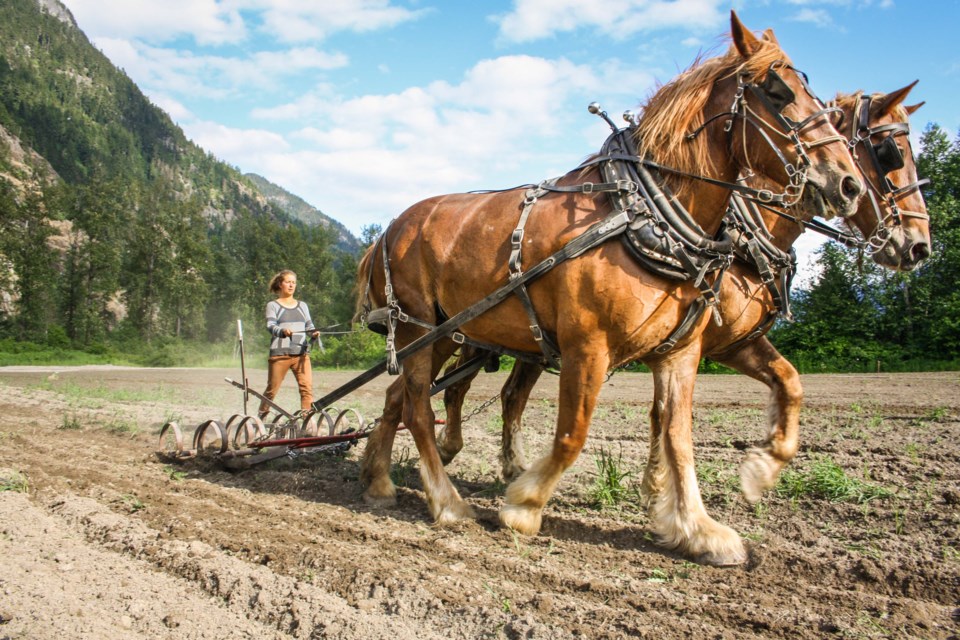Naomi Martz is a farmer without a tractor.
In fact, she uses very little power equipment on her 10-acre Pemberton farm. Instead, the 24-year-old relies predominantly on the power of two Belgian draft horses, Tom and Judy, who do everything from tilling the vegetable beds to taking loads of compost out to the field (and producing their own compost while they’re at it).
“The horses are kind of where it’s at, or else I do things by hand,” says Martz, a North Vancouver native who started leasing Four Beat Farm in April and lives in a small house on the property.
In this day and age, it may seem old-fashioned to use horse-drawn machinery, but the method falls in line with her farming philosophy.
“I was really interested in ways that you can use animals in your systems and looking at renewable sources of energy,” she says. “I like that I don’t have to put gasoline in (the horses) and that I can get hay and grain from my neighbours.”
For her first season, Martz is putting two acres into vegetable production and managing the remainder of the land in pasture and cover crops to increase soil fertility for the future. Starting this summer, she’ll be sharing her harvest with North Vancouver residents. Four Beat Farm is running a community-supported agriculture program with bi-weekly vegetable pickups in Lynn Valley from July 28 to Dec. 1.
Martz thinks of CSA programs as “crop insurance.” Under the business model, households support the farm financially for an entire season, with memberships paid in two instalments of $375 – the first upon signing up, the second in mid-October. In return, members get a share of the harvest designed to provide seasonal vegetables for two to four people until the end of the year.
“The basic idea is that your community of eaters is supporting your farm,” Martz explains, noting the CSA model is based on a notion of shared risk and reward. “By investing in the farm, you’re taking on the risk that maybe certain crops aren’t going to do as well, but then your farmer is able to farm to the best of their abilities with the knowledge that you’re going to support them through it.”
Four Beat Farm is planting more than 35 different types of vegetables to ensure diversity and abundance. While the Pemberton Valley is known as a potato-growing area, Martz says the climate is suitable for many other crops. CSA members can hope to expect household staples, like salads, carrots and onions, on a regular basis. August pickups will likely include heat-loving crops, such as tomatoes, cucumbers, sweet corn, chard and beans. And later pickups will feature fall favourites such as beets, brussels sprouts, parsnips, cabbages, leeks and potatoes.
The acreage Martz is stewarding was previously leased by an organic farmer. She too follows organic practices and is in the process of applying to get organic certification from the Bio-Dynamic Agricultural Society of B.C.
“Most of my go-to methods of farming already stem from that stream of thought,” she says.
A 2009 graduate of Argyle secondary, Martz went to university on the East Coast for environmental studies and economics. Wanting to spend the summer outside, she decided to work on a farm. She loved it and started seeking out experience on certified organic farms and farms that run CSA programs.
“There’s a lot of really amazing people farming that are happy to share what they know and you can learn from their experiences.”
As for the name of her new venture, Four Beat Farm, it comes from the four-beat gait of a horse’s walk: “clip-clop, clip-clop.”
Currently, Tom and Judy are tending to just a small portion of the available land, but Martz is confident they’re capable of working on a larger scale in the future.
“It’s nice to ease into it slowly for our first season,” she says.
To sign up for the CSA program for the 2016 harvest season visit fourbeatfarm.ca.



